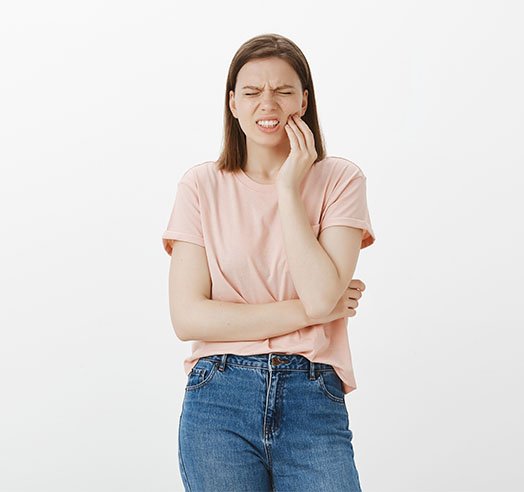Bruxism
Teeth Grinding and Clenching

Bruxism Management Albury
If left untreated, bruxism may lead to long-term tooth wear and damage – hence the need for further dental treatment to correct the damage caused.
If you suspect that you are a bruxer, please call your Albury dentist and schedule an appointment.
Causes of Bruxism
Factors that affect whether or not bruxism causes pain and other problems will vary from person to person. They may include:
- How much stress you have
- How long and how tightly you clench and grind your teeth
- Whether your teeth are misaligned
- Your posture
- Your ability to relax
- Your diet
- Your sleeping habits

Symptoms of Bruxism
- Aching jaw muscles
- Chewed places on the tongue or cheek
- Damage to teeth
- Waking up from the sound of grounding
- Earaches
- Headaches
- Neck pain or soreness
- Noise from the grinding/clenching that wakes your sleeping partner
- Severe facial pain
- Sensitivity to cold, heat, or pressure
- Temporomandibular joint disorder
The symptoms of bruxism may look like other conditions or health issues. Visit your Albury dentist for a diagnosis and treatment.
When to See Your Dentist
See your Albury dentist if you have any of the symptoms mentioned above or have other concerns about your teeth or jaw.
Occlusal Splints
Occlusal splints are custom-made mouthguards for people who grind/clench their teeth, have a history of pain and dysfunction related to their bite or jaw joint, or have completed a full mouth rehabilitation.
Bruxism Management in Albury
Teeth grinding is a condition with many possible causes. Treating it early is important to avoid significant dental complications.
Visit your Albury dentist for a consultation.
Call us on (02) 6021 4171. Request your appointment online.
We are located at 525 Wilson St in Albury.
Frequently Asked Questions
Why do people grind their teeth?
How do I determine if I grind/clench my teeth at night?
- Complaints from a bed partner
- Unexplained damage to teeth
- Painful jaws
- Waking up with a headache
- Changes in the facial appearance
How do I stop teeth grinding?
Early stages of bruxism can be controlled. Simply follow these tips:
- Get enough sleep
- Reduce the consumption of caffeinated and/or alcoholic products
- Engage in relaxing activities such as meditation, exercise and counselling
- Perform relaxing muscle exercises
- Know if you need to increase your magnesium and calcium intake